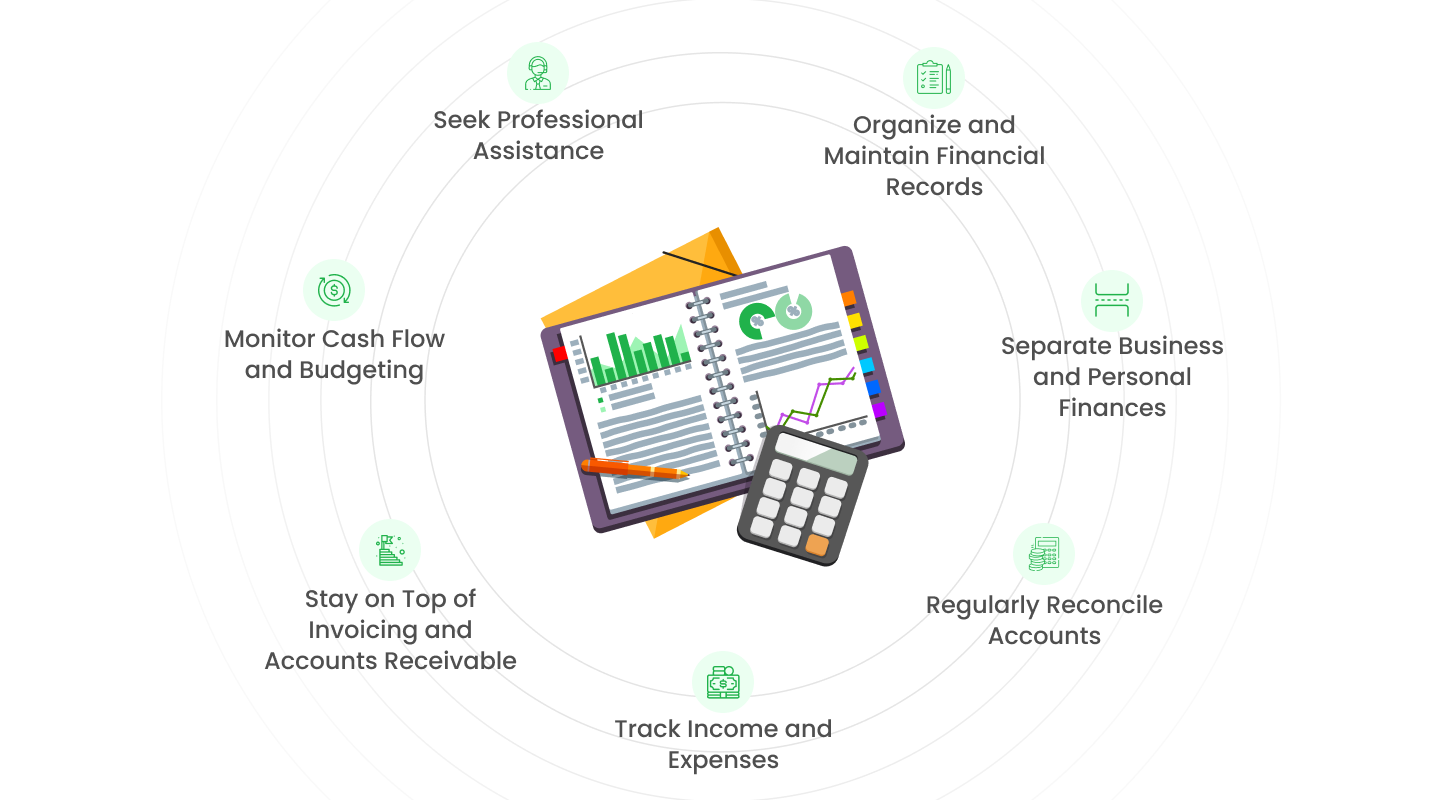In today’s business landscape that is characterized by fierce competitiveness and innovation, effective bookkeeping is crucial for the success and growth of small businesses. Accurate financial records, proper organization, and adherence to accounting principles are essential for making informed decisions and ensuring compliance with regulatory requirements. In this blog, we will explore a range of valuable bookkeeping tips tailored specifically for small businesses. As you navigate the world of bookkeeping, remember that our professional bookkeeping services are here to provide comprehensive support for your financial needs.
Understand the Basics of Bookkeeping
It is pertinent to grasp the foundational understanding of bookkeeping before delving deep into it. Let’s familiarize ourselves with the basics first:
Defining Bookkeeping:
The foundation of any successful business starts with understanding the basic principles of bookkeeping. It involves the systematic recording, organizing, and managing of financial transactions.
Double-Entry Bookkeeping:
Implementing a double-entry bookkeeping system is vital to ensure accurate financial reporting. This method requires recording every transaction with both a debit and a credit entry, maintaining balance and accuracy.

Organize and Maintain Financial Records
Implement a Filing System:
Establish a well-structured filing system for your financial documents, including invoices, receipts, bank statements, and tax-related paperwork. Organize them chronologically and label them appropriately for easy retrieval.
Utilize Accounting Software:
Invest in reliable accounting software to streamline your bookkeeping processes. These tools simplify data entry, automate calculations, and generate reports, saving you time and reducing the risk of errors.
Separate Business and Personal Finances
Open a Business Bank Account:
Keeping personal and business finances separate is crucial for accurate bookkeeping. Open a dedicated business bank account to ensure clarity and avoid confusion when reconciling transactions.
Maintain Separate Expense Records:
Record all business expenses separately from personal expenses. This separation helps to track deductible business expenses for tax purposes and maintain an accurate financial overview.
Regularly Reconcile Accounts
Bank Reconciliation:
Perform regular bank reconciliations by comparing your bank statements with your accounting records. This process helps identify discrepancies and ensures that all transactions are accurately recorded.
Credit Card Reconciliation:
If you use credit cards for business expenses, reconcile them in the same manner as your bank accounts. This practice assists in detecting any missing or erroneous transactions and ensures accurate financial reporting.
Track Income and Expenses
Create a Chart of Accounts:
Develop a comprehensive chart of accounts that categorizes income and expenses specific to your business.
Record Sales and Invoices:
Keep a record of all sales and invoices issued to clients or customers. Include important details such as the date, amount, payment terms, and customer information. This documentation helps monitor cash flow and ensures timely payment collection.
Monitor Expenses:
Maintain a diligent record of all business expenses, including receipts and invoices. Categorize expenses appropriately to track spending patterns, identify cost-saving opportunities, and ensure accurate tax deductions.
Stay on Top of Invoicing and Accounts Receivable
Timely Invoicing:
Send out invoices promptly to ensure timely payment from clients or customers. Clearly outline payment terms, due dates, and available payment methods to encourage prompt payments.
Follow Up on Overdue Payments:
Actively monitor accounts receivable and follow up with customers who have overdue payments. Implement an effective system for reminders and collections to maintain a healthy cash flow.
Monitor Cash Flow and Budgeting
Cash Flow Management:
Regularly review your cash flow statements to understand the inflow and outflow of funds. This analysis helps identify potential cash shortages or surpluses, allowing you to make informed financial decisions.
Create a Budget:
Develop a realistic budget that aligns with your business goals. Track actual expenses against the budgeted amounts to assess financial performance and identify areas for improvement.
Seek Professional Assistance
Consider Outsourcing Bookkeeping:
As a small business owner, your time is valuable. Consider outsourcing your bookkeeping tasks to professionals who specialize in providing accurate and reliable financial management services. This allows you to focus on core business activities while ensuring compliance and financial stability.
Utilize Bookkeeping Services:
Our comprehensive bookkeeping services offer personalized assistance tailored to your business’s unique needs. From managing accounts payable and receivable to financial statement preparation, our team of experts can handle your bookkeeping requirements efficiently and effectively.
Conclusion

Implementing effective bookkeeping practices is vital for the success and growth of small businesses. By understanding the basics of bookkeeping, organizing financial records, separating business, and personal finances, reconciling accounts, and diligently tracking income and expenses, you can maintain accurate financial records and make informed business decisions.
At Oak Street Technologies, we understand the daunting challenges that come with bookkeeping and provide you with the all-inclusive professional bookkeeping services to optimize your financial management processes. Take control of your small business’s financial health today and pave the way for long-term success.



